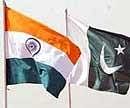
"We are not going to discuss substantive issues like Kashmir. As of now our effort is to create a right atmoshpere. Only then some degree of trust can be created between the two countries," highly-placed sources in the government said.
They said the effort is for eliminating the trust deficit and "we are not not talking to Pakistan on four issues that concern us".
There was no no alternative but to talk to Pakistan as war was not not an option, they said.
The government's stand was made clear in response to a question at a journalistic interaction whether the government's current moves to resume dialogue with Pakistan would be picking up of threads from where the Musharraf regime left or would it be a fresh de novo effort from the beginning.
This was in the context of former Pakistani Foreign Minister Khurshid Mahmood Kasuri's recent claim that India and Pakistan were close to signing an agreement on some crucial issues.
Former President Pervez Musharraf had mooted four areas on which the Pakistani claimed the two countries had come close to an agrement. The areas included demilitarisation of Kashmir on both sides and the Siachen glacier and some kind of autonomy to these areas.
Recently in Bhutan, Prime Minister Manmohan Singh and his Pakistani counterpart Yousuf Raza Gilani decided on resuming dialogue between the two countries. External Affairs Minister S M Krishna will be visiting Pakistan in the middle of next month.
The sources said a lot of things have changed since the Sharm-el-Sheikh controversy and in the context of Prime Minister's deep desire for engagement between India and Pakistan.
The Indian government sees a change in Pakistan's attitude and its tone and tenor has also changed since Sharm-el-Sheikh.
They said the effort was to create a trust between the two countries so that the two could talk in an informal format and then "move forward". The inputs given by back channels were "very useful" for the negotiations, they added.
The sources did not not agree with a suggestion that the long-held consensus in the polity had broken down and that even the Congress party was not not on board on government's initiatives on Pakistan or on the Civil Nuclear Liability Bill.
They dismissed suggestions that Home Minister P Chidambaram was not not in favour of a dialogue with Pakistan. It was a joint responsibility and they did not not think the Home Minister had taken such a view.
Chidambaram himself was going to Pakistan later this month and the government was looking forward to that visit for attending the SAARC Interior Ministers meeting, they said.
The sources said Krishna's visit itself would be a sort of breaking the stalemate since it was a long time an Indian foreign minister was visiting Pakistan.
It would also be sending a message to many countries in the world which are keen that the relations between the two countries improve.
On the recent visit of Krishna to the US, the sources said Washington was impressed on the need for it to open up on export of high technology to India. The Obama administration was sought to be impressed that it was necessary that between two friendly countries there should be more hi-tech import and exports.
On Afghanistan, there was growing realisation and clarity among the world capitals on the importance of India's role there, especially in the building of infrastructure, education and women's development.
"We will continue to do our humble bit in Afghanistan regardless of the obstacles," they said. The sources said efforts were on to sort out issues with other neighbours like China, Nepal and Bangladesh.
Regarding the issue of ethnic Tamils in Sri Lanka, India has impressed on President Mahinda Rajapakse that he should implement his promise of working out a political solution at the earliest.